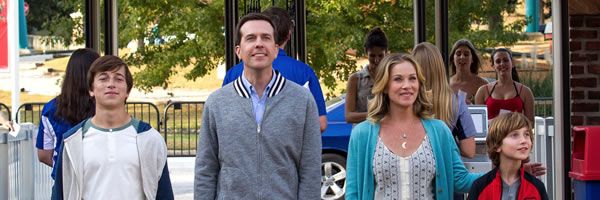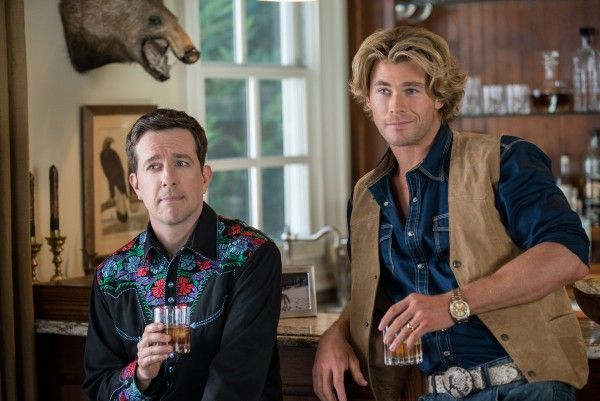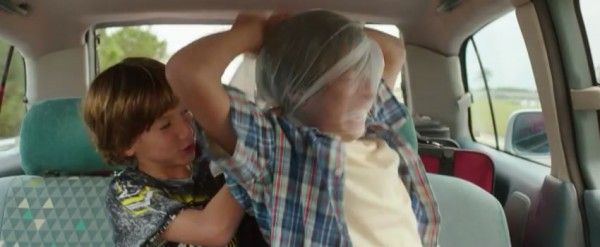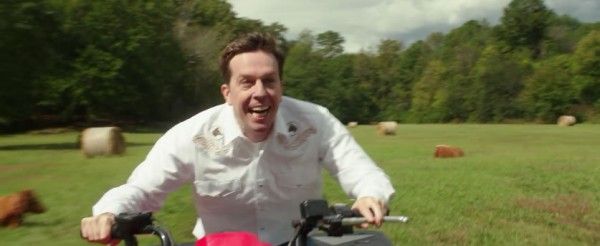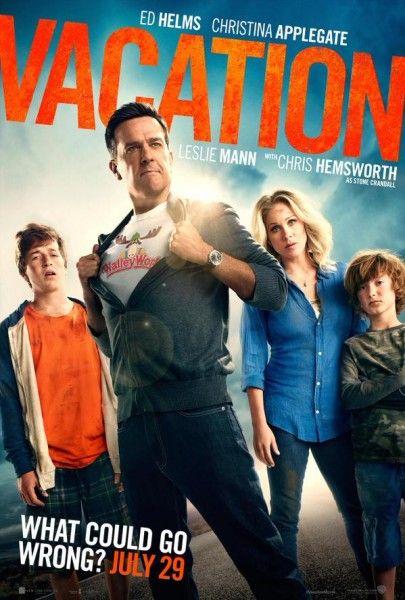I’ll be completely upfront: I have no love for the original Vacation. While I have no problem with mean-spirited, cartoonish comedy, Harold Ramis’ 1983 classic has always struck a sour note with me. So going into John Francis Daley and Jonathan M. Goldstein’s sequel/reboot of the same name, there was no high bar to clear or holy scripture to be worshiped. The general premise of an enthusiastic father taking his reluctant family on a trip to a theme park and encountering a slew of misadventures along the way is still in place, but Daley and Goldstein leave their own stamp on the material, and come away with a film that’s weirder, sweeter, and funnier.
Rusty Griswold (Ed Helms) wants to pull his family out of a funk. They’re tired of going to the same cabin every summer, and so he decides to put on some rose-colored glasses and recreate his childhood trip to Walley World. He believes this trip will cheer up his wife Debbie (Christina Applegate) and help put an end to his younger son Kevin (Steele Stebbins) bullying his older, nerdy brother James (Skyler Gisondo). Along the way, the Griswolds face problems that Rusty should have remembered like having a crappy car and getting robbed along with new ordeals like a vindictive trucker and dealing with Rusty’s sister Audrey (Leslie Mann) and her libidinous husband Stone (Chris Hemsworth).
The framework of the road trip movie gives Daley and Goldstein a lot of room to play around, and they only need the Griswold name, a few callbacks, and Clark (Chevy Chase) and Ellen (Beverly D’Angelo) to make a minor appearance for this to be a “Vacation” movie. From there, the directors decide to employ a diverse range of strange, dark comedy that can play broad like Debbie throwing up on an obstacle course or very specific like one joke involving a rat that I won’t spoil here. Daley and Goldstein don’t confine themselves to any kind of comedy or brand, and it gives their movie plenty of freedom to find a wide variety of jokes.
What makes the new movie work for me more than the original is that the Griswolds here feel like they existed before the movie began. 1983’s Vacation is chomping at the bit to get to its jokes, and it never really establishes who the Griswolds are beyond an average, white, middle-class suburban family. They’re meant to be kind of generic, and this allows the audience project onto to the characters. I can’t tell you anything about young Rusty Griswold, but we all know about awkward heart-to-heart chats with parents.
In the remake, this is a family with its own set of problems that need to be remedied by their journey, and the problems have definition. The conflict between the brothers is excellent. Stebbins and Gisondo are wonderful together, and the movie gets a surprisingly amount of mileage over the simple concept of a younger brother bullying his older sibling. The script also provides them with definition so we can see them as individuals rather than just part of a standard family unit that’s going on a bad vacation. Debbie and Rusty are also trying to deal with problems in their marriage, and while Rusty definitely has his father’s Pollyanna attitude, he plays differently against Debbie, who feels like she has her own goals and breaking points as opposed to Ellen Griswold, who always felt a little bit Stepford.
It also helps that Helms is infinitely more likable than Chase. I’m a firm believer that needing to “root” for characters is a fallacy; you just need to find them interesting. But if you’re going to be trapped on the road with a character and you want to see him or her persevere, then they may want to be someone at least vaguely likable. Helms radiates charm with his goofy, toothy smile and positive energy; Chase could never fully mask his seething contempt for humanity.
The new Vacation may be more broad than the original, and I seriously doubt it will have the staying power, but it’s far more charming thanks to better defined characters, stronger performances, and a willingness to nod at the original while not stopping to worship it. In the film’s sole instance of meta-comedy, Rusty tells his family “The new vacation will stand on its own.” He’s right, and it’s a trip that’s far more fun.
Rating: B

